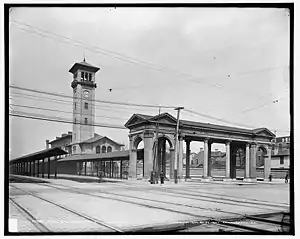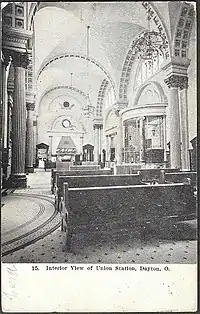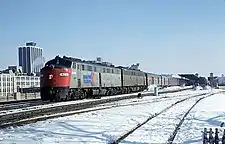Dayton Union Station
Dayton Union Station was a railroad station serving Dayton, Ohio with daily passenger trains of several railroads. The station was located at 251 W. Sixth Street at the intersection of Ludlow Street, and it opened in 1900, replacing an earlier depot built in the mid-1850s. It was owned by the Dayton Union Railroad Co., which was owned by the Cincinnati, Hamilton and Dayton Railway, the Cleveland, Cincinnati, Chicago and St. Louis Railway, and the Pittsburgh, Cincinnati, Chicago and St. Louis Railroad.[1] Through a series of mergers over the years, it was ultimately owned by the New York Central Railroad, Baltimore & Ohio Railroad and Pennsylvania Railroad.
Dayton Union Station | ||||||||||||||||||||||||||||||||||||||||||||||
|---|---|---|---|---|---|---|---|---|---|---|---|---|---|---|---|---|---|---|---|---|---|---|---|---|---|---|---|---|---|---|---|---|---|---|---|---|---|---|---|---|---|---|---|---|---|---|
| inter-city rail station | ||||||||||||||||||||||||||||||||||||||||||||||
 Dayton Union Station In 1904 | ||||||||||||||||||||||||||||||||||||||||||||||
| Location | 130 West 6th Street, Dayton, OH 45402 | |||||||||||||||||||||||||||||||||||||||||||||
| Coordinates | 39.76 N, 84.19 W | |||||||||||||||||||||||||||||||||||||||||||||
| Elevation | 740 ft | |||||||||||||||||||||||||||||||||||||||||||||
| History | ||||||||||||||||||||||||||||||||||||||||||||||
| Closed | 1979 | |||||||||||||||||||||||||||||||||||||||||||||
| Former services | ||||||||||||||||||||||||||||||||||||||||||||||
| ||||||||||||||||||||||||||||||||||||||||||||||
Colloquially called the "Tower Depot," it included a seven-story clock tower.[2][3] In the first 30 years of operation, the station hosted as many as 66 passenger trains a day. In 1931 the station opened an elevated platform to alleviate congestion between trains, streetcars and automobiles.[4]
Famous personalities that stopped by the station included child actress Shirley Temple in 1944, President Harry S. Truman in 1948 and President Ronald Reagan in 1983, both of the latter two making campaign stops, Reagan making a whistle stop tour.[5]
Named trains

| Operators | Named trains | Western or northern destination | Eastern or southern destination | Year begun | Year discontinued |
|---|---|---|---|---|---|
| Amtrak | National Limited | Kansas City, Missouri | New York, New York | 1971 | 1979 |
| Baltimore and Ohio | Great Lakes Limited | Detroit, Michigan | Cincinnati, Ohio | 1947 | 1950 |
| Baltimore and Ohio | Cincinnatian | Detroit, Michigan | Cincinnati, Ohio | 1950 | 1971 |
| Baltimore and Ohio | Night Express | Detroit, Michigan | Cincinnati, Ohio | 1960 | 1967 |
| Cleveland, Cincinnati, Chicago and St. Louis, in 1930 absorbed into the New York Central | Cincinnati Mercury | Cincinnati, Ohio | Cleveland, Ohio | 1952 | 1956 |
| Cleveland, Cincinnati, Chicago and St. Louis, in 1930 absorbed into the New York Central | Cleveland Special / Cincinnati Special | Cincinnati, Ohio | Cleveland, Ohio | 1919-1924 1932 | 1957 |
| Cleveland, Cincinnati, Chicago and St. Louis, in 1930 absorbed into the New York Central | Michigan Special / Ohio Special | Detroit, Michigan | Cincinnati, Ohio | 1930 | 1958 |
| Cleveland, Cincinnati, Chicago and St. Louis, in 1930 absorbed into the New York Central | Midnight Special | Cincinnati, Ohio | Cleveland, Ohio | 1939 | 1958 |
| Cleveland, Cincinnati, Chicago and St. Louis, in 1930 absorbed into the New York Central | Ohio State Limited | Cincinnati, Ohio | New York, New York | 1924 | 1967 |
| New York Central Railroad | Florida Sunbeam | Detroit, Michigan | Miami, Florida | 1936 | 1949 |
| Pennsylvania Railroad | American | St. Louis, Missouri | New York, New York | 1925 | 1956 |
| Pennsylvania Railroad | Indianapolis Limited | Indianapolis, Indiana | New York, New York | 1950 1953 | 1957 |
| Pennsylvania Railroad Penn Central (1968-1970) | Penn Texas | St. Louis, Missouri | New York, New York | 1948 | 1970 |
| Pennsylvania Railroad Penn Central (1968-1971) | Spirit of St. Louis | St. Louis, Missouri | New York, New York | 1927 | 1971 |
| Pennsylvania Railroad | St. Louisan | St. Louis, Missouri | New York, New York | 1913 | 1967 |
Decline
In summer 1964 part of the station was demolished to make way for an extension of Sixth Street. Amtrak took over passenger service in 1971, and cut back service to a single train, the Spirit of St. Louis, inherited from Penn Central. That train was subsequently extended to Kansas City and renamed the National Limited.

The last train out of the station was the National Limited, which was eliminated in October, 1979 when U.S. Transportation Secretary Brock Adams opted to eliminate half a dozen Amtrak routes he deemed lower performing.[6] The last remnants of the station were removed altogether in 1989.[7][8]
Notes
- "New Union Passenger Station at Dayton O." Engineering News and American Railway Journal. 46. Engineering News Publishing Company. 1901.
- Lisa Powell, Dayton Daily News, February 20, 2018, "In its day, Dayton’s Union Station was a “handsome palace”" https://www.daytondailynews.com/lifestyles/its-day-dayton-union-station-was-handsome-palace/HvuqWd4qkqWQYWsfPDl1rN/
- The Great Union Stations, "Dayton's Passenger Stations of the Past" https://www.chicagorailfan.com/stbcday.html
- Lisa Powell, Dayton Daily News, February 20, 2018, "In its day, Dayton’s Union Station was a “handsome palace”" https://www.daytondailynews.com/lifestyles/its-day-dayton-union-station-was-handsome-palace/HvuqWd4qkqWQYWsfPDl1rN/
- Lisa Powell, Dayton Daily News, February 20, 2018, "In its day, Dayton’s Union Station was a “handsome palace”" https://www.daytondailynews.com/lifestyles/its-day-dayton-union-station-was-handsome-palace/HvuqWd4qkqWQYWsfPDl1rN/
- Ernest Holsendolph, New York Times, August 30, 1979, "Amtrak Eliminates 6 Passenger Routes Totalling 6,000 Miles," https://www.nytimes.com/1979/08/30/archives/amtrak-eliminates-6-passenger-routes-totaling-5000-miles-trims-made.html
- Lisa Powell, Dayton Daily News, February 20, 2018, "In its day, Dayton’s Union Station was a “handsome palace”" https://www.daytondailynews.com/lifestyles/its-day-dayton-union-station-was-handsome-palace/HvuqWd4qkqWQYWsfPDl1rN/
- Lisa Rickey, Wright State University Libraries' Special Collections and Archives, June 16, 2016 "Dayton’s Union Station: Later Years 1960s+"
External links
| Wikimedia Commons has media related to Union Station (Dayton, Ohio). |
- Wright State University Libraries' Special Collections and Archives - Dayton’s Union Station: Early Years -Photos of the station in its earliest decades
- Wright State University Libraries' Special Collections and Archives - Dayton’s Union Station: 1940s & 1950s -Photos of the station from the mid-20th Century
- Wright State University Libraries' Special Collections and Archives - Dayton’s Union Station: Later Years 1960s+ -Photos of the station from the 1960s to the 1980s